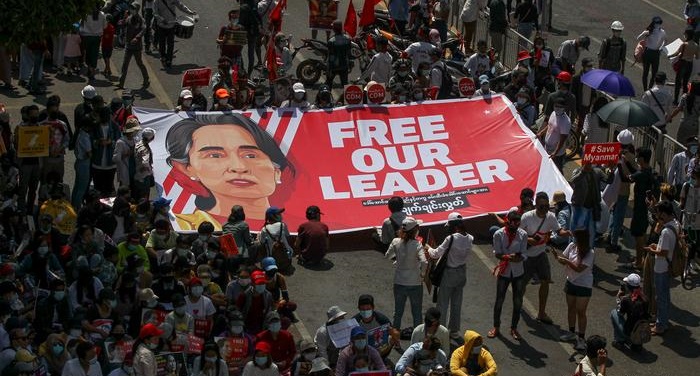
The trial of Myanmar's ousted leader Aung San Suu Kyi got underway on Monday in the capital Naypyidaw, more than four months after a military coup.
Criminal convictions would bar Suu Kyi from running for office.
Suu Kyi's prosecution prevented her National League for Democracy (NLD) party from serving a second five-year term following last year's landslide election victory.
Army officials have also threatened to dissolve the NLD for alleged involvement in election fraud.
What charges does Suu Kyi face?
The 75-year-old stands accused of violating coronavirus regulations while campaigning for the election she won last November and for possession of unlicensed walkie-talkies.
She is also facing other more serious charges including intent to incite, breaching the official secrets act and charges for accepting $600,000 (€495,000) and 11.4 kilograms (25 pounds) worth of gold from Yangon's former chief minister.
Another trial against her is expected to start on Tuesday. In this trial, Suu Kyi and the deposed president Win Myint are charged with incitement to public disturbance.
Suu Kyi's legal team have denied any wrongdoing.
The first trial is expected to run until the end of July, her lawyer said.
"We are hoping for the best but prepared for the worst," Khin Maung Zaw, one of Suu Kyi's lawyers, told French news agency AFP ahead of the hearing.
If convicted of all charges, she faces more than a decade in jail.
Government prosecutors have until June 28 to finish their presentation. Suu Kyi's defense team will then have until July 26 to present its case, Zaw said last week.
Court sessions are due to be held on Monday and Tuesday each week.
International reactions to trial
Human Rights Watch called the allegations against Suu Kyi "bogus and politically motivated" with the intention of preventing her from running for office again.
"This trial is clearly the opening salvo in an overall strategy to neuter Suu Kyi and the National League for Democracy party as a force that can challenge military rule in the future,'' said Phil Robertson, the organization's deputy Asia director.
Debbie Stothard, coordinator of the Alternative ASEAN Network on Myanmar, slammed it as a "show trial."
"Min Aung Hlaing is determined to lock up Aung San Suu Kyi for the rest of her life. If he could, he would probably charge her under every law available," she told AFP, referring to the army chief.
Military takeover
Citing government failure to properly investigate alleged voting irregularities, the military seized power on February 1, ending a 10-year phase of democratic change in the Southeast Asian country.
The junta has claimed it will hold new elections within the next year or two but it has a long history of promising elections and not following through.
The Association for Political Prisoners (AAPP), an activist group outlawed by the junta, says 5,965 people have been arrested since the coup. Of those, 4,804 remain in prison, interrogation centers, and under house arrest.
At least 860 people have been killed, 22 of those from torture during detention, the AAPP reports.